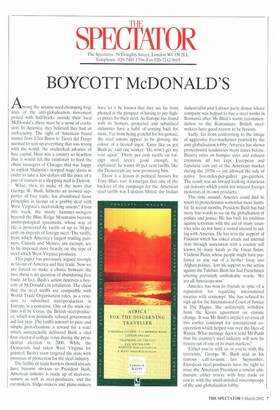BOYCOTT McDONALD'S A nong the sesame-seed-chomping brigands of the anti-globalisation movement
poised with half-bricks outside their local McDonald's, there must be a sense of confusion. In America, they believed they had an arch-enemy. The sight of American brand names from Ulan Bator to Tierra del Fuego seemed to sum up everything that was wrong with the world: the unchecked advance of free capital. Here was a country so heartless that it would fell the rainforest to feed the obese teenagers of Chicago; that was happy to exploit Malaysia's stooped wage slaves in order to take a few dollars off the price of a pair of trainers in a shopping mall in Detroit.
What, then, to make of the news that George W. Bush, hitherto an avowed supporter of free trade, has abandoned those principles in favour of a grubby deal with West Virginia's steel-making unions? From this week, the manly hammer-swingers beyond the Blue Ridge Mountains become anthropological specimens, whose way of life is protected by tariffs of up to 30 per cent on imports of foreign steel. The tariffs, from which America's largest trading partners, Canada and Mexico, are exempt, are to be imposed most heavily on the type of steel which West Virginia produces.
This paper has previously argued strongly in favour of America and free trade. Now we are forced to make a choice between the two, there is no question of abandoning free trade, In fact, Bush's action deserves a boycott of McDonald's in retaliation. The claim that the steel tariffs are compatible with World Trade Organisation rules, as a reaction to subsidised steel-production in Europe, is a nonsense. One of the main victims will be Corus, the British steel-producer, which was pointedly refused government aid last year. The tariffs amount to pure and simple protectionism: a reward for a state which unexpectedly delivered Bush a vital four electoral-college votes during the presidential election in 2000. While the Democrats had taken West Virginia for granted, Bush's team targeted the state with promises of protection for the steel industry.
The futility of trade barriers should already have become obvious to President Bush. American industry is made up of steel-consumers as well as steel-producers, and the car-makers. fridge-makers and plane-makers have let it be known that they are far from pleased at the prospect of having to pay higher prices for their steel. As Europe has found with its farmers, protected and subsidised industries have a habit of coming back for more. Far from being grateful for his gesture, the steel unions appear to be glowing the colour of a heated ingot. 'Guys like us got Bush in,' said one worker. 'He won't get my vote again.' Thirty per cent tariffs on foreign steel aren't good enough, he explained: he wants 40 per cent tariffs, like the Democrats are now promising him.
There is a lesson in political favours for Tony Blair, too: it emerges that one of the backers of the campaign for the American steel tariffs was Lakshmi Mittal, the Indian industrialist and Labour party donor whose company was helped to buy a steel works in Romania after Mr Blair's warm recommendation to the Romanians. British steelmakers have good reason to be furious.
Sadly, far from conforming to the image of aggressive free-marketeer painted by the anti-globalisation lobby, America has shown protectionist tendencies many times before. Bizarre rules on bumper sizes and exhaust emissions all but kept European and Japanese cars out of the American market during the 1970s — yet allowed the sale of native five-miles-per-gallon gas-guzzlers. The result was an inward-looking American car industry which could not interest foreign motorists in its own products.
This time around, America could find its resort to protectionism somewhat more harmful. In recent months, President Bush has had many fine words to say on the globalisation of politics and justice. He has built his coalition against terrorism with the aid of many countries who do not have a vested interest in siding with America. He has won the support of Pakistan which has risked attack and internal riots through association with a country still known by many locals as the Great Satan. Vladimir Putin, whose people might have preferred to stay out of a further foray into Afghan politics, lent his support to the action against the Taleban. Bush has had Frenchmen uttering previously unthinkable words: 'We are all Americans now.'
America has won its friends in spite of a reputation for regarding international treaties with contempt. She has refused to sign up for the International Court of Justice in The Hague. She unilaterally withdrew from the Kyoto agreement on climate change. It was Mr Bush's implicit reversal of this earlier contempt for international cooperation which helped win over the likes of Russia. What message does it send Mr Putin that his country's steel industry will now be frozen out of one of its main markets?
'Either you're with us or you're with the terrorists,' George W. Bush said in his famous call-to-arms last September. European steel-producers have the right to issue the American President a similar ultimatum: either you're with free trade or you're with the small-minded nincompoops of the anti-globalisation lobby.














































































 Previous page
Previous page